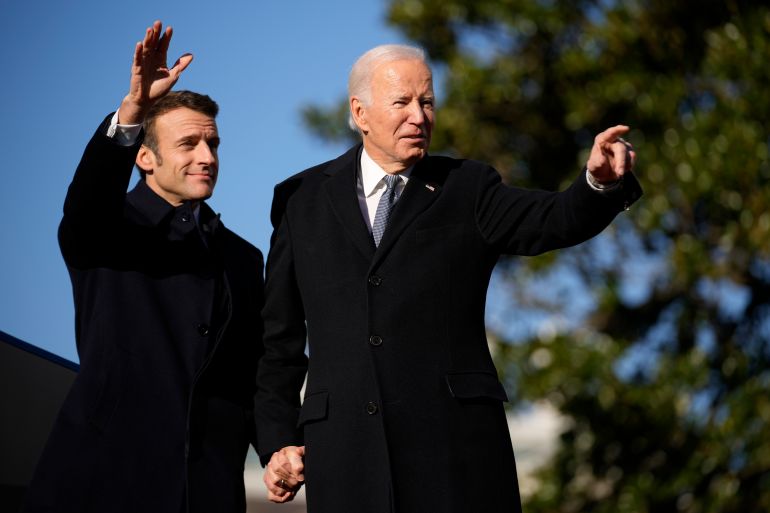Biden and Macron seek to manage friction over US climate law
Joe Biden acknowledges the law has ‘glitches’ after his French counterpart said it has caused the ‘absence of a level playing field’.

US President Joe Biden and his French counterpart Emmanuel Macron have pledged to continue working on shared commitments – namely supporting Ukraine against Russia’s invasion – and to manage trade tensions linked to United States climate legislation.
“France and the United States are once again defending the democratic values and universal human rights, which are the heart of both our nations,” Biden said on Thursday during an official ceremony outside the White House ahead of talks with Macron.
Keep reading
list of 3 itemsUS embassy, five other sites targeted by letter bombs in Spain
US President Joe Biden announces Indigenous spending increase
The French president was equally emphatic in describing the strength of the US-France relationship, invoking the historic moments that brought the two nations together, including the US intervention in World War II to free France from Nazi Germany.
“Our two nations are sisters in the fight for freedom,” said Macron, before referencing the war in Ukraine.
“We bear a duty to this shared history as war returns to European soil following Russia’s aggression against Ukraine. And in light of the multiple crises our nations and our societies face, we need to become brothers in arms once more,” he added.
Biden is set to honour Macron with the first state dinner of his presidency later on Thursday.
First, the two leaders held talks in the Oval Office that officials from both nations said were expected to largely centre on efforts to stay united in response to the war in Ukraine and to pursue a coordinated approach to China.
In a statement describing the discussion, the White House said Biden and Macron pledged to deepen cooperation on a wide-ranging list of issues, including assistance to Ukraine, collective defence, nuclear deterrence, climate change, and bilateral investment and trade.
“They look forward to the work of the US-EU Taskforce on the Inflation Reduction Act to further strengthen the US-EU partnership on clean energy and climate through mutually beneficial ways,” the statement said.
But before Thursday’s meeting, Macron said he and other European leaders remained deeply concerned about Biden’s signature climate law, which favours American-made technology, including electric vehicles.
The French president criticised the Inflation Reduction Act, saying the US incentives were hurting European companies by providing an unfair advantage to their American competitors.
Macron said that while Washington and Paris were “working closely together” on geopolitics and opposing Russia in its invasion of Ukraine, provisions of the act and other US laws that affect international trade were not coordinated with Europe.
“They create just the absence of a level playing field,” he told ABC’s Good Morning America earlier on Thursday. Macron had stressed a similar message in a speech at the French Embassy on Wednesday, saying “the choices that have been made … are choices that will fragment the West”.
Germany’s economy minister Robert Habeck also said on Wednesday that Europe opposes the US subsidies.
“I believe that this view is largely shared by those countries that are committed to a multilateral trading order,” Habeck told reporters in Berlin. “The Americans know that we see it that way and the European Commission will have told them this, too.”
During a joint news conference alongside Biden on Thursday afternoon, Macron took a softer tone, telling reporters that hampering European businesses was “not the intention” of the Inflation Reduction Act but rather an unintended consequence.
“We want to succeed together, not one against the other,” Macron said.
For his part, Biden acknowledged “glitches” in the clean energy law that have raised concerns in Europe, but said “tweaks” could be made to satisfy Washington’s allies.
“There are tweaks that we can make that can fundamentally make it easier for European countries to participate and/or be on their own,” Biden told reporters, adding that his administration would “continue to create manufacturing jobs in America but not at the expense of Europe”.
Macron’s visit to Washington came a year after the US, the United Kingdom and Australia irked France by signing an agreement that will see Washington and London provide nuclear-powered submarines to Canberra.
The trilateral pact, known as AUKUS, saw Australia scrap a deal for conventional French submarines.